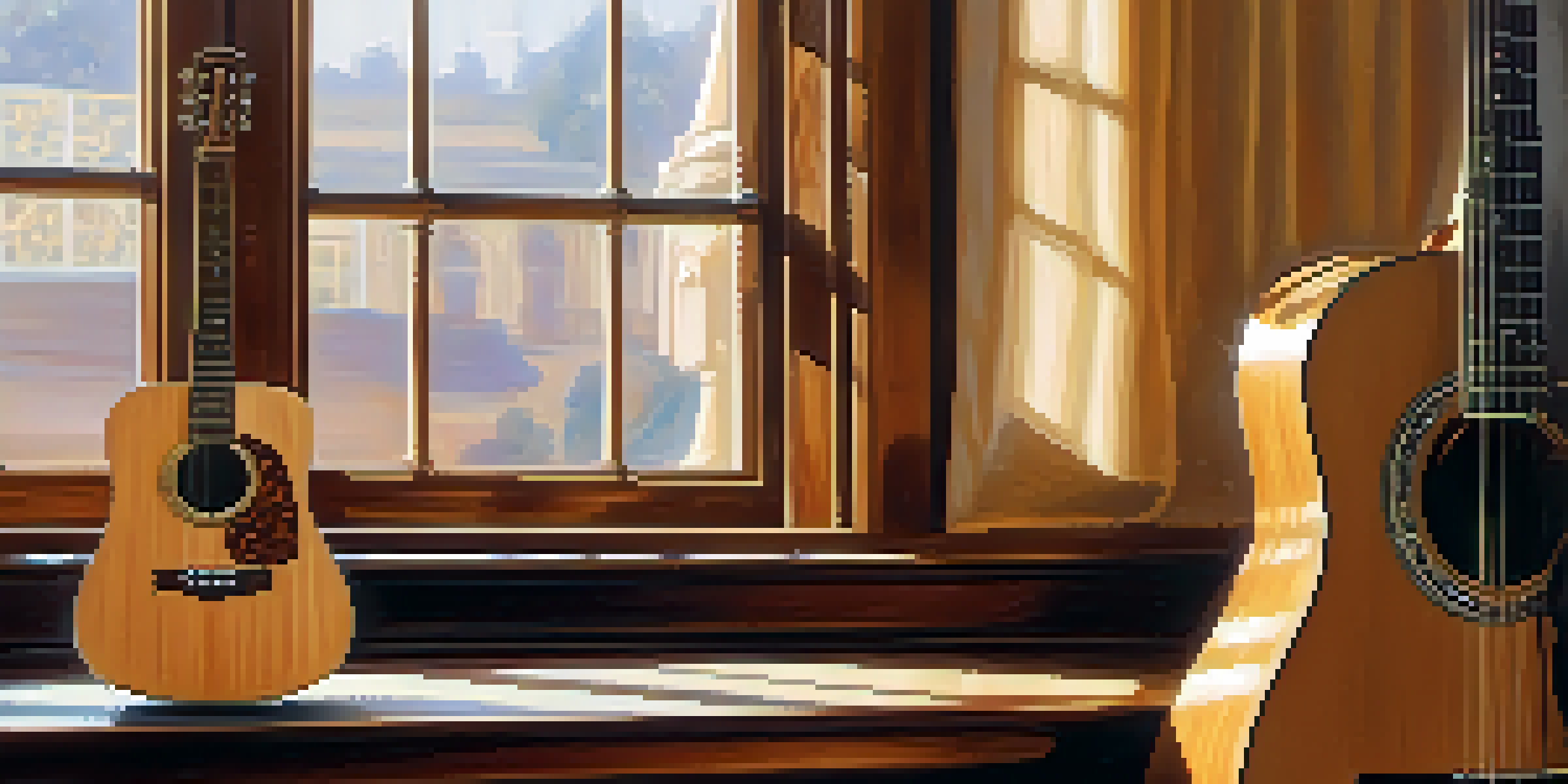Understanding Music Licensing for Guitarists in Today's Market

What is Music Licensing and Why Does it Matter?
Music licensing is the process that allows creators to use copyrighted music legally. For guitarists, this means understanding how you can play, record, or distribute music without facing legal issues. It’s essential for anyone looking to monetize their music or perform publicly.
Without music, life would be a mistake.
In today’s digital landscape, where sharing music is as easy as a click, knowing about licensing helps protect your creative work. Imagine putting hours into a song only to find out you can’t use it in your next gig or video because you didn’t secure the rights. Being informed saves you from potential frustrations down the road.
Moreover, music licensing opens doors to opportunities, such as getting your music placed in films, advertisements, or streaming platforms. When you grasp the basics of licensing, you position yourself strategically in the competitive music market.
The Different Types of Music Licenses Explained
There are several types of music licenses, each serving a unique purpose. The most common ones include mechanical licenses, performance licenses, and synchronization licenses. Each type allows you to use music in different contexts, from recording to live performances.

For instance, if you're a guitarist who wants to record a cover of a popular song, you'd need a mechanical license to reproduce the track. On the other hand, if you're performing that same cover live, a performance license is necessary. Understanding these distinctions is key to navigating the licensing landscape.
Understanding Music Licensing Basics
Music licensing is crucial for creators to use copyrighted music legally and avoid legal issues.
Additionally, synchronization licenses are required if you want to pair music with visual media, like videos or films. This can be particularly lucrative for guitarists looking to get their music into the film and television industry, so knowing the right licenses can elevate your career.
How to Obtain Music Licenses as a Guitarist
Obtaining a music license might sound daunting, but it’s quite straightforward once you know the steps. First, identify the type of license you need based on how you plan to use the music. This clarity will guide you through the process of securing the appropriate rights.
Music can change the world because it can change people.
Next, you can either go through a licensing agency or contact the copyright holder directly. Agencies like ASCAP and BMI help facilitate licensing for public performances, while platforms like Harry Fox Agency assist with mechanical licenses. Knowing where to turn for these licenses can save you time and effort.
Lastly, always read the terms of your licensing agreement carefully. This ensures that you're fully aware of the rights you’re purchasing and any restrictions that might apply. A well-informed guitarist is a successful one!
The Role of Copyright in Music Licensing
Copyright is a legal framework that protects original works, including music. For guitarists, understanding copyright is crucial because it determines who owns the rights to a song and how it can be used. If you write your own music, you automatically hold the copyright, giving you control over its use.
However, if you want to cover someone else's song, you need to respect their copyright by obtaining the necessary licenses. This means the original creators are compensated for their work, which is a fair practice in the music industry. Just like you want to be paid for your music, so do they!
Types of Music Licenses Explained
Different types of music licenses, including mechanical, performance, and synchronization licenses, serve unique purposes for various contexts.
Additionally, registering your music with a copyright office can provide stronger legal protection against unauthorized use. This step is often overlooked but can be vital in ensuring that your rights as a guitarist are safeguarded.
The Impact of Streaming on Music Licensing
The rise of streaming platforms has dramatically changed the music landscape, including how licensing works. Services like Spotify and Apple Music require different licensing agreements than traditional music distribution. This shift means guitarists must adapt to new rules and regulations in this evolving market.
For example, streaming services often operate under blanket licenses, which allow them to play a vast catalog of music without needing individual agreements for each song. While this benefits listeners, it can complicate how guitarists receive royalties. Being aware of how these platforms operate helps artists strategize their music distribution effectively.
Moreover, with the rise of user-generated content platforms like TikTok and YouTube, understanding licensing for these mediums is essential. Guitarists can gain exposure and build a fanbase through covers and original pieces, but they must ensure they have the right licenses to avoid potential takedowns.
Common Misconceptions About Music Licensing
Many guitarists hold misconceptions about music licensing that can hinder their careers. One common myth is that performing a song live doesn’t require any licenses. In reality, venues often need to secure performance licenses to cover the artists they host, so it's crucial to understand how this works.
Another misconception is that simply crediting the original artist on social media is enough to use their music. While tagging artists is a great way to show appreciation, it doesn’t grant you the legal right to use their music in your own projects. Always seek the proper licenses to avoid issues.
Importance of Copyright Awareness
Knowing copyright laws ensures that musicians respect original creators' rights and protects their own music from unauthorized use.
Lastly, some might think that licensing is only necessary for commercial use. However, even non-commercial projects can require licenses, especially if you’re sharing music online. Knowing these truths can empower guitarists to navigate the licensing world more effectively.
Navigating International Music Licensing
If you're a guitarist looking to expand your reach beyond local gigs, understanding international music licensing is vital. Each country has its own set of copyright laws and licensing requirements, which can vary significantly from what you're used to. This means that what works in your home country may not apply elsewhere.
For instance, if you plan to tour internationally, you might need to secure different licenses for each country you perform in. This can involve additional research and potentially higher costs, but it’s essential to avoid legal troubles. A simple misstep could lead to hefty fines or even a ban from performing in that country.

Moreover, collaborating with international artists can also bring about licensing challenges. It’s important to establish clear agreements that outline how each party can use the music to ensure a smooth partnership. Being informed about international music licensing can open up exciting opportunities for guitarists willing to explore the global stage.
Tips for Guitarists to Stay Compliant with Licensing
Staying compliant with music licensing doesn’t have to be overwhelming. One of the best ways to ensure you’re in the clear is to keep thorough records of all your licenses. Whether it's physical documents or digital files, having everything organized will save you headaches during audits or legal inquiries.
Additionally, consider joining a music rights organization. These groups can provide valuable resources, guidance, and updates on licensing changes. They also often offer networking opportunities with other musicians who are navigating similar challenges.
Finally, continue educating yourself about music licensing. The industry is constantly evolving, and staying informed will help you make better decisions regarding your music. By being proactive, you can focus more on your passion for playing guitar while ensuring your rights are protected.